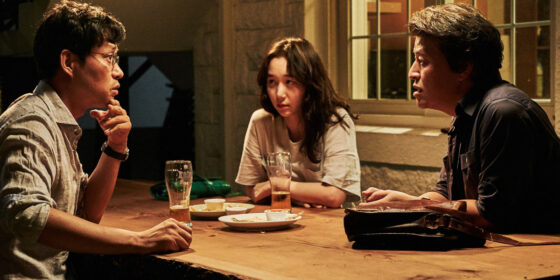Yourself and Yours (Hong Sangsoo, South Korea) — Masters
 By Robert Koehler
By Robert Koehler
A parlour game likely to happen at many festivals around the world over the next several months will be this: Is there one Minjung who appears on screen as the central female character in Hong Sangsoo’s Yourself and Yours, or are there at least two, maybe even three? Does she have an identical twin? Is she a pathological liar, or the victim of ruthless gossip? If you turn this into a drinking game (preferably with Hong’s drink of choice, soju), you will be guaranteed to have many drunk cinephiles by the end of the evening. Even more than usual, Hong leaves these and other questions open to the viewer, a key element in his artistry and human comedy, and a reason why distributors and exhibitors have never been fond of him.
Unlike certain past Hong scenarios—such as his previous Locarno Golden Leopard-winning Right Now, Wrong Then (2015), which created the possibility of two pathways for his characters—Yourself and Yours is closer to a Rohmerian moral tale, with a single narrative track containing a situation that leads to personal self-discovery. Immediately after watching it at TIFF, I felt that it was a fairly minor piece by Hong, but after a couple of days digesting it the film has grown for me, its prescription for relationships resonating in ways that go far beyond the pleasures of watching sly and elegant Hongian games play out on screen.
A small speech from Alain Resnais’ Muriel (1964) could sum up the spirit of Yourself and Yours: “We never know those we love. We think we do, but we don’t. Every person is a world.” As usual with Hong, the man in the male-female comedy is a fool—in this case he’s named Youngsoo (Kim Joo-hyuck), an artist whose mom is dying. But that isn’t his real crisis: instead, it’s the rumour being floated by a neighbour and pal that his girlfriend Minjung (Lee You-young) is a lush who fools around with other men.
It may not be true, but it poisons the well of Youngsoo’s mind, and when he challenges her about the rumour, her denials don’t sway him. Doubt breeds contempt, and yet, the evidence in front of our eyes suggests that Youngsoo’s fears may be true—until we’re once again uncertain. A woman who certainly looks exactly like Minjung is seen alone drinking at a bar-restaurant, and yet she denies to an older man that she’s Minjung. She insists that she’s Minjung’s identical twin sister. Can we believe it? What is to believe anyway?
The viewer is presented with two sets of possibilities, both of which can’t be true, either of which is somewhat plausible. The solution to this conundrum isn’t the point: instead, it is Youngsoo coming to terms with what’s really his lover’s ploy at liberation. Minjung owns the line of the movie, the one that everyone who sees it will be quoting—“I’ve never seen a truly impressive man”—and it is a means by which Hong allows his female protagonist to own the movie as well. Youngsoo’s friends resent Minjung for speaking her mind (not always admired in Korean society), and her “doubling” (and possibly “tripling”) is her way of breaking social codes altogether. Hong’s string of scenes bring Youngsoo to a kind of self-realization that’s as sneaky as the way things began, and it’s as simple as this: Live and let live. But, Hong being Hong, it doesn’t stop there. Near the end, Minjung asks him, “Do you know me?” Youngsoo, in a moment of honesty that he wouldn’t have been capable of at the start, says, simply, “No.”
Robert Koehler
- « Previous
- 1
- 2


